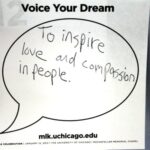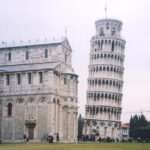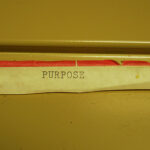Sometimes it is more important to discover what one cannot do than what one can do. – Lin Yutang
What does that mean?
To me, this is about where your talents are and where they are not. No matter how badly you want to play the piano at Carnegie Hall, if the best you can do is “chopsticks,” you need to find another outlet.
When looking at the infinite possibilities of the distant future, you need to know what can and cannot be done, so that you can map out the best path from where you are to where you want to go.
Why is self-knowledge important?
Ludwig von Beethoven became deaf, a tough blow to a performing pianist. He then went from performer to writer, and learned how to hear the music in other ways (bone conduction being the primary method used). Knowing what you cannot do, in his case, meant the end of his performance as a member of an ensemble since he could not hear what others were doing and keep in synch with them.
By becoming the conductor, however, he was the one with whom all of them needed to keep up. If he could follow the music in his head and queue the musicians at the proper time, all was well. As the Maestro, he could then take to the piano and the rest of the orchestra was expected to keep up with him. Problem solved, if in a non-intuitive manner to most of us. He recognized his limits, what he could no longer do, and found a way to make his dreams come true.
Erik Weihenmayer is a blind guy, since he was a teen. He has also climbed Mt Everest. And the Seven Summits (tallest mountain on each continent). He also skydives, skis, climbs rocks, runs marathons and does long distance bicycling events. Makes me feel inadequate, how about you? He learned his limits, what he could not do. Then he found ways to do the things he wanted to do and did them. He did them bigger and better than most people on planet Earth could possibly imagine doing with both eyes open.
Both of the examples I have listed are of people that have found their limits, found out what they could not do, and used that information to find ways to do what they wanted to do despite these pesky challenges like being a deaf musician or a blind mountaineer.
Where can I apply this in my life?
If, like me, you had dreams of playing professional sports, you need to have the body to withstand it. My introduction to the heart of this quote while playing pee-wee league (10-14 year old kids). Due to a growth disorder, the ligaments in my knees and ankles were being damaged from the inside. Like they say, Game Over! The “injury” also ruled out basketball, gymnastics, baseball, track & field, soccer, lacrosse and hockey.
Looking around at what was left, I chose swimming. I wasn’t really great at swimming, but it was fun and good exercise. I was the youngest kid at my community pool to receive a Junior Life Saving certificate and I had a lot of fun at the pool for years and years. As for football, I sit in a comfy chair and explain to my kids what happened on the field after each play, until they get bored.
I also had dreams of making it big in the music industry. I had a fair voice and some wicked chops, but there isn’t much demand for Trombone anymore. That said, a few years after I gave up on trying to get anywhere with music, the Big Band revival hit. For a few years, there would have been a window, if I had kept up with it and kept working it. That was a failure of my dedication, knowing a limit on my endurance.
I considered writing music, but that didn’t get off the ground as my dyslexia makes reading sheet music (and writing it, as well) problematic at best. I play almost strictly by ear, but that’s a simple problem, overcome by many great artists. My lyrics stank, and would have needed years of work to be worth the paper they were written on.
Again, my dedication and endurance failed me, I reached my limit and stopped. I still enjoy music, sing along and pick out melodies on piano, chords on guitar. I just realized that I didn’t have the drive to take it all the way, that I just couldn’t do that. My creativity is now directed at software, electronics, wood working, car modification and many other hobbies.
What are some of the things you wanted to be when you grew up? Seriously, not the passing whims of a child, but the things you really wanted to be? Write a few of them down. Grab a pencil and paper, I’ll wait. No, one isn’t “a few,” is it? Let’s get at least three please. I’ll be here, humming a tune with the radio. Hmmmm hmm, la la, hmmm. Ready? Great!
OK, for each of the paths the child-you had hoped to take your life, list what personal limit(s) kept you from achieving your goal? Was it a limit of your body, of your schooling, of your resources, of your endurance?
I had wanted to be a doctor, until I found out how many years of school it would take, and how much biology it would take, and how much chemistry it would take. So I went with Plan B. With each of those limits in mind, ask yourself if those limits still exist. Can they be overcome? Can they be worked around? How badly do you still want that dream career?
Next, consider what was the actual motive? Did you want to be an astronaut because you wanted to go into space, to explore, to get a view of the earth from above, or because you grew up thinking it was the coolest gig out there?
Once you have dug deep enough to understand the motivation behind your dream, consider what present job might be able to give you a similar thrill or sense of fulfillment. Is that a bit more approachable? Even at 60, people are learning to fly small aircraft and seeing the world from “up there.” It might not be as spectacular as from orbit or the moon, but it beats crawling in the dirt.
For me, football was all about the challenge of mastery of my body, being able to get the most out of it as possible. Instead, I do martial arts, and get the same feeling of accomplishment when I begin to understand a movement, and begin to make it my own. For me, music was everything, and it still is. I just realized I didn’t need to see my name in lights to be happy. For me, creativity went from writing music to writing code and my many hobbies.
Know your limits, but do not be limited by them. Reach for your dreams.
From: Twitter, @Sports_Greats
confirmed at: http://www.great-quotes.com/quote/1050639
Photo by Grant O’Shea








Pingback: Entrepreneurs are simply those who understand that there is little difference between obstacle and opportunity and are able to turn both to their advantage. | philosiblog